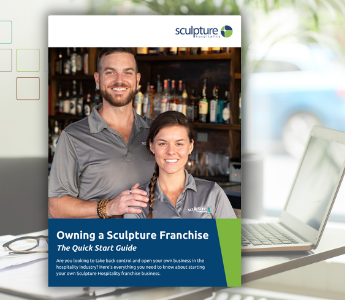Here at Sculpture Hospitality we have a range of franchise opportunities for people who love the hospitality industry but want to regain control of their lives and improve their work-life balance.
Yet, while owning a franchise can be a great way to start a business (with the added benefits of an established brand and support from a reputable franchisor), we often receive questions on whether owning a franchise is a profitable move.
The answer is yes! However, it's important to carefully consider the financial aspects of franchise ownership to ensure you make a wise investment. In this blog, we'll explore the key factors that impact the profitability of franchises, and provide tips for making an informed decision.
Checklist: Are You Ready to Own a Hospitality Franchise?
What is a Franchise?
A franchise is a business model where a franchisor grants a franchisee the right to use its brand, products, and services in exchange for a fee. There are several types of franchises, including:
- Product Distribution Franchises
In this type of franchise, the franchisor supplies products to the franchisee, who then resells them to customers. This type of franchise typically requires less investment upfront, but may have lower profit margins.
- Business Format Franchises
In this type of franchise, the franchisor provides the franchisee with a complete business model, including branding, products, and services, as well as ongoing support. This type of franchise can be more expensive upfront, but may offer higher profit potential.
- Management Franchises
In this type of franchise, the franchisor provides the franchisee with management services, including training, recruitment, and financial management. This type of franchise is typically more hands-off for the franchisee, but may require a higher initial investment.
Factors That Impact Franchise Profitability
The profitability of a franchise depends on several factors, including:
Upfront and Ongoing Costs
Before investing in a franchise, it's important to carefully consider the costs involved. These can include an initial franchise fee, as well as ongoing royalties, marketing fees, and other expenses required to operate the franchise. Be sure to review the franchise agreement carefully and ask questions before signing.
Brand Reputation
A strong brand reputation can help attract customers and generate sales, leading to higher profits. Conversely, a weak brand reputation can make it difficult to attract and retain customers. Consider the strength of the franchise's brand and its reputation in the industry before investing.
Location
The location of the franchise plays a critical role in its profitability. A franchise located in a high-traffic area with a target audience can generate more sales and profits than a franchise located in a low-traffic area. Before selecting a location, analyze the area's demographics, competition, and accessibility.
Support From the Franchisor
The level of support provided by the franchisor can significantly impact the profitability of the franchise. A franchisor that provides comprehensive training, ongoing support, and assistance with marketing and advertising can help franchisees maximize their profits. On the other hand, a franchisor that provides minimal support can make it challenging for franchisees to succeed.
What are the Downsides of Franchise Ownership?
While owning a franchise can be a profitable venture, it's important to also consider the potential downsides. Some of the potential risks and challenges of franchise ownership include:
- Lack of Control Over Branding and Marketing: As a franchisee, you'll be required to follow the franchisor's guidelines for branding and marketing, which can limit your flexibility and creativity. This can make it challenging to differentiate your business from competitors or adapt to changing market conditions.
- Conflicts With the Franchisor: Franchisees may experience conflicts with the franchisor over issues such as royalties, marketing fees, or the use of proprietary products or services. It's important to carefully review the franchise agreement and seek legal advice if necessary before investing.
- Finding the Right Location: Finding the right location for a franchise can be challenging, particularly in competitive industries. Factors such as demographics, traffic, and accessibility can all impact the success of the franchise.
How to Find the Right Franchise Opportunity
If you're considering investing in a franchise, here are some tips to help you evaluate the opportunity:
1. Talk to Existing Franchisees
One of the best ways to evaluate a franchise opportunity is to talk to existing franchisees. Ask about their experience, profitability, and level of support provided by the franchisor. This can help you get a sense of the potential challenges and benefits of franchise ownership.
2. Research the Industry and CompetitionBefore investing, it's important to research the industry and competition to understand the potential demand for the franchise's products or services. Look for trends in the industry and identify areas of potential growth or opportunity.
3. Review the Franchise AgreementCarefully review the franchise agreement and seek legal advice if necessary. Make sure you understand the terms and conditions of the agreement, including fees, royalties, and any restrictions on your ability to operate the business.
Owning a franchise can be a profitable venture, but it's important to carefully consider the financial aspects of franchise ownership before investing. Factors such as upfront and ongoing costs, brand reputation, location, and support from the franchisor can all impact the profitability of the franchise.
Interested in learning more about owning a Sculpture Hospitality franchise and how our opportunities can help you make money and improve your overall quality of life? Get in touch with our team today.












